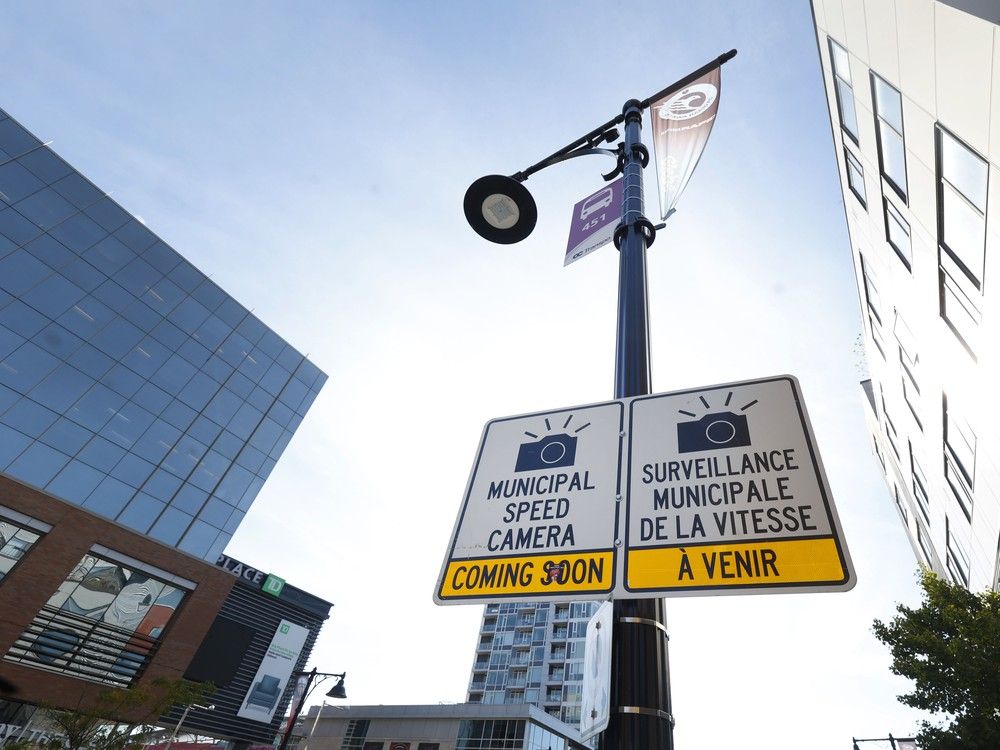The other night, as I was lulled to sleep by the roar of
street racers
half a mile away, I thought I heard a couple of drivers yell: “Three cheers for Doug Ford!” Then again, perhaps it was just a fever dream.
The Ontario premier’s
recent announcement
that he wants municipalities to scrap automated speed enforcement cameras — and his threat to “help” cities get rid of them if they don’t comply — is great news for Ontario’s irresponsible drivers. They can once again risk their own and other people’s lives without unwanted government meddling. Who’s to stop them? Will the already undermanned Ottawa Police Service redirect guns-and-gangs officers to do the job that speed cameras are clearly better at?
Ford’s bias towards motorists (at least the gas-powered kind) is well documented. Last fall, his government introduced Bill 212: Reducing Gridlock, Saving You Time Act (also, can we please stop giving pieces of legislation stupid names?) to block construction of new bike lanes and rip out existing ones. (In July, Ontario’s Superior Court of Justice ruled the law unconstitutional, a decision the province has appealed.)
At the same time, the government has Ford-ged ahead with the construction of Highway 413, a multi-lane sprawl-inducing highway that environmentalists, planners and municipalities have opposed. And there’s also the premier’s unwavering pledge to build a large traffic tunnel under Highway 401.
Ford calls speed cameras “nothing but a tax grab.” As do many reckless drivers. But surely he knows that speeding fines are not taxes. Even if they were, they’re voluntary: If you don’t want a speeding ticket, don’t speed.
That’s not always easy, I admit. Driving along Meadowlands Drive between Prince of Wales and Merivale, a 40 km/h zone, I routinely set the cruise control to 40 to avoid going faster. The lanes, after all, are wide, the road straight. It feels like a 60 km/h road. But it’s not; it’s a residential street, surrounded by homes and people. I don’t want motorists driving 60 or more down my street; I assume they don’t want me imitating Jacques Villeneuve on theirs. True, it sometimes feels like I’m leading a funeral procession, but those extra minutes it takes are worth knowing I’m not creating one.
Unfortunately, Ford’s fury over speed cameras isn’t driven by data. That not his forte.
A
study
conducted by SickKids hospital in Toronto and published in July in the British Medical Journal’s Injury Prevention journal found that the use of speed cameras in school zones led to a 45 per cent reduction in speeding motorists, while the 85th percentile speed — the speed at or below which 85 per cent of the drivers travelled — dropped by almost 11 km/h. “The observed reduction in speed is likely important in reducing collisions and injuries,” the study noted.
In Ottawa,
compliance with speed limits
rose from from 16 per cent before speed cameras to 57 per cent after only three months, and to more than 80 per cent after three years. Instances of speeding at more than 15 km/h above the posted limit dropped from 14 per cent, pre-speed cameras, to less than one per cent after three years of the city using them.
A
survey
of more than 1,000 Ottawa residents, meanwhile, determined that of the 35 per cent of respondents who had been dinged with an speed camera fine, 69 per cent said it changed their driving behaviour. That’s what we want from these cameras.
But getting residents to buy into the use of speed cameras is difficult, especially with the premier saying they should be gone. While at least 80 per cent of Ottawa residents supported using speed cameras near schools, parks and playgrounds, only 49 per cent favoured using them on “any road where there is speeding” and only 45 per cent support their use in high-speed corridors. Thirty per cent, meanwhile, simply don’t believe speed cameras are effective.
If it’s the “tax grab” impression that has chiefly soured residents, there are ways to adjust the system without getting rid of the cameras altogether. Warnings could be issued for first offences. Fines could be reduced for minor infractions and increased for repeat offenders, or replaced by demerit points imposed on vehicle owners, regardless of who’s behind the wheel. Perhaps drivers could be allowed to take a road-safety education course that could lower or replace their fines.
What doesn’t work is the premier making it easier for motorists to drive too fast, too recklessly and with virtually no consequences, and leaving the rest of us crossing our fingers that we’re not awakened at night by ambulance sirens.
Our website is your destination for up-to-the-minute news, so make sure to bookmark our homepage and sign up for our newsletters so we can keep you informed.
Related
- OPP weekend blitz nets nearly 80 speeders, other offenders
- Deachman: Let’s call stunt driving what it is — reckless, dangerous and unacceptable



